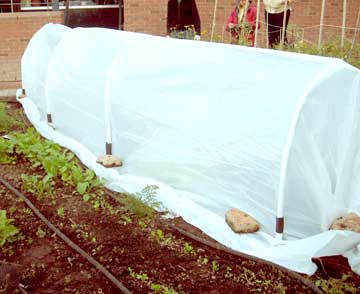 |
Previous Issues |
| Cedar Mill Community Website |
|
| Search the Cedar Mill News: | About The Cedar Mill News |
|
|||||||
| Volume 8, Issue 12 | December 2010 |
||||||
Summer Dreams: Garden Planning in the Pacific Northwest
|
PermaDonna's favorite seed companiesTerritorial Seed territorialseed.com/ Botanical Interests botanicalinterests.com Uprising Seeds http://uprisingorganics.com/ Seed Savers exchange www.seedsavers.org Adaptive Seeds www.adaptiveseeds.com Fedco Seeds www.fedcoseeds.com Turtle Tree Biodynamic Seed Initiative Horizon Herbs www.horizonherbs.com/ |
Some of my favorite catalogues are listed in the box , left. Most of these offer locally adapted seeds, and all of them offer organic and heirloom varieties. You can read more about what heirloom varieties are in my October article.
Each seed packet will have directions on the back telling you when to sow indoors to transplant or direct-seed outdoors for that particular variety, according to the last frost date. The average last-frost date for Portland is April 26, but you can watch the weather forecast if conditions aren't average.
If you have the time and space, starting seeds in a portable mini-greenhouse works well. These are widely available, easy to set up, and suitable for even the apartment dweller. If not, you can start seeds indoors on a well-lighted south-facing windowsill.
If you don't have the time or space, purchasing plant starts at your local nursery is a great option. The most difficult plants to grow in our climate are the heat lovers—tomatoes, peppers, etc.—and those are readily available as starts.
When it is time to transplant the seedlings, you may want to use a cold frame or temporary hoop house/tunnel (these can also be used for direct seeding of some species). The simplest way to construct one of these is to bend one-inch PVC pipe over the beds with the ends firmly stuck in the ground, and cover the hoops with clear or opaque plastic. The sides can be secured with rocks, wood, or landscape staples. One of the major problems with spring gardening in the PNW is that it rains so late into the season. These are extremely useful for drying out water-logged beds and warming up the soil so that you can begin planting in early Spring. Here is a useful how-to article on the construction of a cold frame tunnel: tipnut.com/tunnel-cold-frame
 |
A simple hoop-house for starting and protecting heat-loving veggies |
If you're going to put in a new garden site, it is important to consider sun exposure (ideally the spot where the plants receive the most sunlight), access to water, and your own convenience. Depending on your particular situation this can mean a small plot in your backyard, containers on your deck or balcony, or a combination of both. There are several web software apps available to help you lay out, plan and manage your garden. Just search for "vegetable garden planner."
Soil preparation is the most important factor in the health of your plants. Most native PNW soils are clay based and require amendments in the form of compost and manure to add necessary "life" to the soil. For more detailed information on soil building see my July and August articles.
In my experience, there is always a surplus of food that I cannot consume at harvest time, so learning how to preserve (freezing, canning, drying, pickling, and cold storage) has been useful, and will let you "eat local" all year long. Storey Books publishes a series of "Country Wisdom Bulletins" on these subjects, and the Ball "Complete Book of Home Preserving" has been my favorite reference on the subject.
While most of us are "Dreaming of a White Christmas," I'll be dreaming of a green Spring and the abundance of the summer garden.
Published monthly by Pioneer Marketing & Design
Publisher/Editor:Virginia Bruce
503-803-1813
PO Box 91061
Portland, Oregon 97291